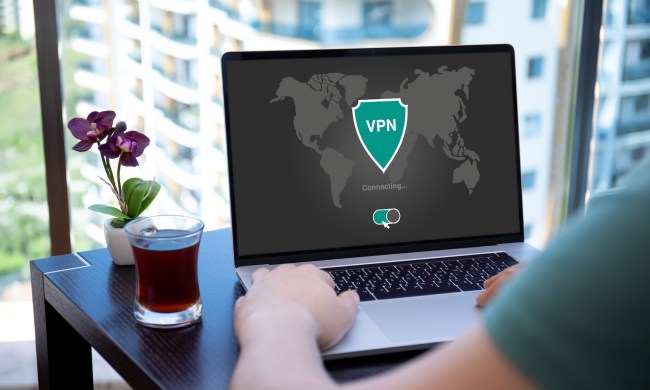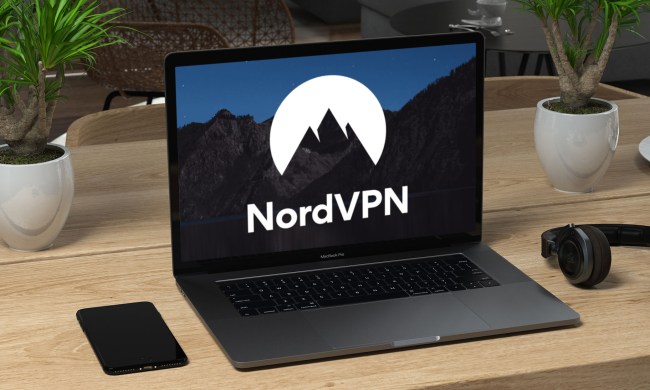With so many different providers out there, it can be hard to know what the best VPN is for your needs. That’s why we’ve taken the time to narrow things down and pit major VPN services against other major VPN services. This time around, we’re looking at ExpressVPN and CyberGhost.
Both are big names in the VPN world and it can be hard to know how to differentiate the two. Both also benefit from good reviews and strong popularity so how do you know which one is best for your needs? Once you fully understand what is a VPN, read on while we guide you through the strengths and weaknesses of both. We look at the features both services provide along with how fast they are, their pricing, and what devices they support, to help you pinpoint what works for you.
ExpressVPN vs. CyberGhost: Devices

Both ExpressVPN and CyberGhost allow for many devices to be connected to a VPN simultaneously. ExpressVPN offers up to five devices connected at once while CyberGhost boosts that up to seven devices. In both cases, you don’t have to worry about numbers if you change settings or use the relevant router app to ensure your entire network is covered by the VPN at all times.
ExpressVPN offers VPN apps for PC, Mac, Linux, Android, and iOS. It also offers a Chrome VPN extension as well as extensions for Firefox and Edge. However, there’s no Apple TV VPN app or apps for Amazon Fire TV Sticks or similar. Instead, you’ll need to set up ExpressVPN at a router level to ensure all your devices at home are protected.
CyberGhost also offers numerous VPN apps. Besides Windows, Mac, and Linux options, it also has iOS and Android apps too. Extensions for Chrome and Firefox are available although there’s no support for Edge at this time. CyberGhost goes one step further for streaming needs though. It has apps for Amazon Fire TV Stick as well as Android TV. Again though, don’t count on an Apple TV app. Much like when using a VPN on games consoles, both services require you to change settings on the device or on your router.
Both ExpressVPN and CyberGhost offer reasonably clear instructions on how to change settings on your router or an individual device so you don’t need to use a dedicated app if you don’t want to. However, by doing so, the process is generally simpler and more user-friendly.
Winner: CyberGhost
ExpressVPN vs. CyberGhost: Features
Both ExpressVPN and CyberGhost offer extensive features for keeping your browsing history safe and secure. Notably, besides offering strict no-log policies, both are located in countries where there are no issues with privacy laws. ExpressVPN is based in the British Virgin Islands while CyberGhost is located in Romania. However, CyberGhost does not run an independent security audit each year to back up its claims of not keeping any logs. In comparison, ExpressVPN conducts yearly, third-party security audits of its servers, source code, and logs, so it can guarantee that it keeps things secure and private. For the average user, this may not be a dealbreaker but for those that are extra security-conscious, it’s tough to beat ExpressVPN.
ExpressVPN also offers a ton of features. Like some other VPNs, it has a split tunneling feature which means that users can route some but not all of their browsing through a VPN. It’s a feature that’s ideal if you plan on streaming content and avoiding georestrictions while still wanting to view local content elsewhere. ExpressVPN also utilizes a network lock kill switch so that if your VPN connection drops, all online activity is blocked until it is restored.
Elsewhere, a threat manager blocks any apps or sites from communicating with trackers and other potentially malicious third parties. It also uses obfuscation features to hide your VPN traffic more effectively meaning it can frequently circumvent any blocks or issues placed by government agencies, making it a good choice for anyone living amongst a repressive regime.
In contrast, CyberGhost keeps things a little simpler but is still very effective. It keeps your data and browsing activity secure but it also provides ad blocking functionality too so your browsing is uninterrupted. There’s built-in leak protection too in the form of a kill switch any time your VPN connection drops. Via the app, you can also set up different user profiles for different purposes too, such as for tweaking your connection for gaming or streaming.
When it comes to streaming, CyberGhost has a one-click option here. The idea is that it could become the perfect VPN for streaming at the touch of a button. It certainly works well as a Netflix VPN making it possible to change country locations fairly easily. However, ExpressVPN uses a DNS service called MediaStreamer which is specifically designed to improve your streaming experience, as well as works well with devices that don’t natively support VPN.
Winner: ExpressVPN
ExpressVPN vs. CyberGhost: Speed
When it comes to considering speeds, it’s important to see how many servers both companies provide. ExpressVPN offers 160 VPN server locations across 94 countries. It amounts to around 3,000 servers. However, CyberGhost has more servers overall at 7,200 but across fewer countries — 91 in all.
On the surface, CyberGhost might seem like the best option but it all comes down to server quality and protocols. In most reports, ExpressVPN is far faster than CyberGhost. Often, CyberGhost is reasonably speedy for a VPN but ExpressVPN is far superior. If you’re looking for a VPN that means your speeds are not too far behind your regular internet speeds, ExpressVPN is widely regarded to be the most reliable choice you could make.
Some of this success is down to the protocols used. For instance, use ExpressVPN’s Smart Connection feature and you’ll rarely get the best speeds. Pick a server manually, however, and things improve. If you notice a speed drop, it’s worth experimenting and seeing how things can differ for you and your browsing needs.
CyberGhost uses the WireGuard protocol which is often considered to be pretty fast but ExpressVPN has its own Lightway protocol which ends up much faster than OpenVPN and other commonly used protocols. They also both offer the use of the OpenVPN and IKEv2 protocols but it’s likely you’ll stick with their killer features — WireGuard or Lightway.
Winner: ExpressVPN
ExpressVPN vs. CyberGhost: Price
Neither ExpressVPN or CyberGhost offer a VPN free trial but they are very good value for money. Ultimately, the best VPN deals come from committing to an extended period of time. Month by month deals are rarely good value here and it’s a smart move to commit to a VPN service for at least 12 months, if not longer.
ExpressVPN is priced at $13 per month on a month-by-month basis. Alternatively, that price drops to the equivalent of $10 per month if you go for the six-month plan which costs $60 every six months. The best value option is to commit to a 12-month plan. That works out at the equivalent of $6.67 per month, billed at $100 per year. At the moment, you also get three months free included. Whichever plan you go with via ExpressVPN, the company offers a 30-day money-back guarantee if you are unhappy with its service. Payment can be made via all major credit cards, Paypal, as well as Bitcoin if you want maximum anonymity.
CyberGhost also offers a money-back guarantee but it’s longer than ExpressVPN’s as it lasts for 45 days. Similar to ExpressVPN, the best value comes from longer commitments. Month-by-month is $13 per month, while a year’s subscription is just $47 per year, working out at just under $4 per month.
Extend that even further, and CyberGhost works out at just over $3 per month or $75 for two years. The best value proposition is a three-year plan which tosses in an extra three months for free and works out at only $83 every three years. If you want a dedicated IP, you need to pay an extra $5 per month for the opportunity although at least CyberGhost offers the facility, unlike ExpressVPN. It’s possible to pay for CyberGhost via all major credit cards, PayPal, Apple Pay, or Bitcoin.
Winner: CyberGhost
ExpressVPN vs. CyberGhost: Verdict
ExpressVPN and CyberGhost are very closely matched for many users. ExpressVPN has additional features compared to CyberGhost. These include split tunneling and slightly better tools for hiding a VPN connection from a suspicious government. It also conducts regular third-party audits so you can feel confident in knowing that it’s not tracking your activities. However, for many users, these won’t be essential as they simply want to keep safe from potential hacking threats.
Instead, it’s the price of CyberGhost that may tempt users the most, in conjunction with its simple-to-use interface that ensures even novices can figure out what to do. It’s incredibly cheap if you’re willing to commit to a number of years through the service. It comes with a penalty though with CyberGhost typically being much slower, speed-wise than ExpressVPN. When it comes to browsing the internet or streaming content, this should not be a significant issue but for keen gamers or those who download plenty of files each day, the speed hit can become quite irritating. After all, you want to get the most from your regular internet service.
Both VPN services are pretty easy to use at least, with a clear button to automatically connect to the best server that second, and plenty of options for those that wish to tweak. Both sites also clearly lay out instructions for setting up things manually at the router level or for individual devices.
For privacy alone, it’s also hard to pick a winner between these two, until you check out that audit policy. Both work well at keeping your data secure at all times so you can browse without worrying too much about anyone tracking you. An ad blocker via CyberGhost is reassuring too. Knowing which VPN is best for you really comes down to what else you plan on doing with your internet time. If you aim to streaming plenty, ExpressVPN could sway you with its MediaStreamer functionality but if security and low prices are everything, then CyberGhost will more than suffice. Ultimately, both are pretty good with the deciding factor coming down to exactly what you need to use them for.



